Do aphrodisiacs really work?
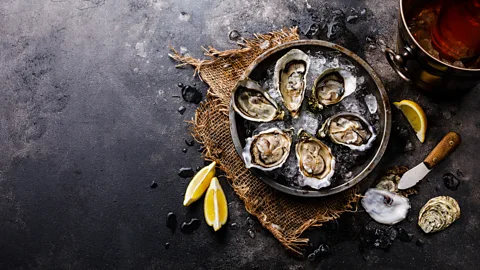 Getty Images
Getty ImagesChocolate, strawberries, oysters: we’ve all heard that certain foods can heighten our sexual desire and even performance. But is there any truth to the claims?
Named after Aphrodite, the Greek goddess of love, aphrodisiacs are said to increase libido, potency, and sexual pleasure. Who hasn't heard that chocolates, strawberries and oysters can have such a powerful effect? Historically, aphrodisiacs have included even quirkier edibles – including the toxic Spanish fly, ground rhinoceros and rare plant extracts.
In fact, during research for her book Intercourses, co-author Martha Hopkins found that almost every food has been considered an aphrodisiac at one time.
"Historically, foods considered to be aphrodisiacs were hard to find, rare or expensive, like truffles, foie gras and caviar, or shaped like a sex organ, like asparagus or artichokes, and even animal testicles," Hopkins says.
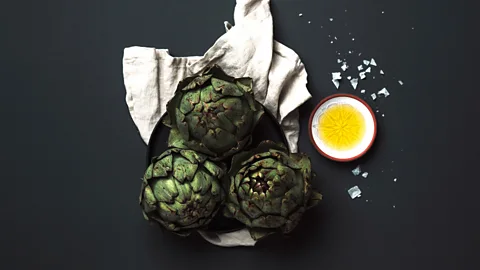 Getty Images
Getty ImagesWhile we tend to think of aphrodisiacs in terms of lust, romance and libido, in the 17th Century – when everything from pigeons to almonds to parsnips were considered aphrodisiacs – they were associated with reproduction and fertility and given to married couples as more of a medical substance, says Jennifer Evans, senior lecturer in history at the University of Hertfordshire who researches the history of food and fertility.
You might also like:
But can any food really affect sexual desire and performance? And why is the idea so persistent?
Aphrodisiac foods: fact or fiction?
For those who have problems with their circulation, it’s true that certain foods can help in a similar way to Viagra medication – by relaxing blood vessels and improving blood flow to the genitals. The amino acid L-arginine, found in foods such as pumpkins, walnuts and beef, is converted to nitric oxide in the body, which increases blood flow. So do foods high in omega 3 fatty acids, including salmon and avocado. Another helper is quercetin. Found in apples, berries, grapes, red wine, garlic and dark chocolate, quercetin has anti-inflammatory properties that can improve blood flow.
What is an aphrodisiac?
Aphrodisiacs are substances – food or drugs – that increase levels of arousal, sexual desire, behaviour and pleasure after consuming them.
Named after the Greek goddess of love and passion, Aphrodite, assorted cultures through history have sought foods that might entice lovers into bed or enhance a person's sexual performance. Many are rare or luxury delicacies. Some also have more than a passing resemblance to sexual organs, or have odours that fire up the senses.
In ancient Rome, for example, a stumpy herb called silphium was prized for its odiferous sap and its juice was used as an aphrodisiac (although it also may have been used as a form of birth control). Today chocolate, figs and oysters feature in the long list of familiar foods with supposed aphrodisiac properties. But others are bizarre and downright expensive, such as a "phallic" clam known as the geoduck.
However, only people with compromised blood flow will see any improvements to sexual function by eating these foods, says Lauri Wright, spokesperson for the US Academy of Nutrition and Dietetics. Someone with good circulation isn't likely to see any changes.
When most of us think of aphrodisiacs, though, we don't think about sexual function, but desire.
One food that’s long been believed to heighten sexual desire is chocolate. Studies have shown that cocoa can increase blood flow in parts of our body beyond our torso. But when its direct relationship with sexual desire was studied, there was no evidence found to support its use as an aphrodisiac.
In fact, one observational study from 2021 found the opposite. Researchers asked 700 people about their interest in sex and their chocolate consumption. It found that women who ate chocolate more often also reported having less interest in sex. They controlled for other possible reasons for low sex drive or high chocolate consumption, including low mood, blood pressure and calorie intake. The results, they suggest, indicate that eating chocolate might act as a substitute for sex by stimulating the production of neurotransmitters serotonin and dopamine, which both also play a role in our sexual responses.
In fact, no evidence has been found proving that any one food heightens sexual arousal or desire.
There is one exception: alcohol. A number of small studies have shown alcohol consumption is linked to arousal. But it can also impede sexual performance.
Red wine in particular may be indirectly linked to sexual function because of its potential benefits to heart health, says Michael Krychman, obstetrician, gynaecologist and a clinical sexual counsellor at the Southern California Center for Sexual Health and Survivorship Medicine.
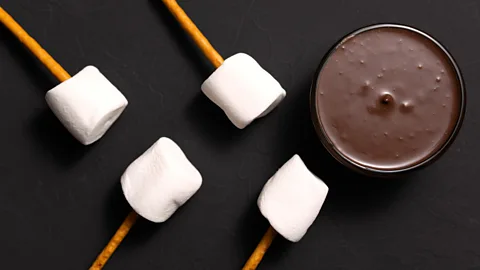 Getty Images
Getty ImagesA 2022 review of more than 50 population-based studies concluded that up to four servings of red wine per week was associated with a lower risk of cardiovascular death compared to beer and spirits. However, as the researchers explained, there are many other confounding factors that might explain this relationship. Overall, the link between red wine and cardiovascular health remains inconclusive.
How lifestyle and diet can boost your sex life
Wine's reputation as an aphrodisiac also may come from the fact that it's part of the Mediterranean diet, defined as consisting primarily of plant-based foods such as fruits, vegetables, wholegrains, legumes and nuts, fish and olive oil and being relatively low in sugar, cheese and meat. More of a lifestyle than a single food, the Mediterranean diet may have aphrodisiac qualities.
"Research has found that red wine affects sexual function, but we don't know if it's the diet, or a combination of diet, lifestyle and genetics," Krychman says. "What we do know is that, for people who exercise, have a healthy diet and lower stress, all these elements work together and they have better sex lives."
Our overall diet can work as an aphrodisiac through benefits like improved blood flow, increased hormones or elevated mood, says Wright.
One study involving 600 women with type two diabetes found that the Mediterranean diet was linked to lower levels of sexual dysfunction, while another study concluded the diet may also be associated with an improvement of erectile dysfunction. "The bottom line is that a healthy diet of seafood, lean meats, nuts, fruit, vegetables and wholegrains, which is basically the Mediterranean diet, helps support nerve function and supports blood flow and hormones," Wright says.
 Getty
GettyThe reason there is no supporting evidence for any individual food to be an aphrodisiac is a good one: any one food having such a potent effect would be dangerous, says Jessica Abbott, senior lecturer in evolutionary ecology at Lund University in Sweden.
"Most of the food we eat isn't going to have side effects, which is reassuring. If they did, it wouldn't be safe to eat them regularly," she says. "Any herbs that have been associated with aphrodisiacs are the types of food we wouldn't usually eat much of, such as touch-me-not plants and high-dose root extract, which have active compounds used as defence against herbivores."
The psychology behind "aphrodisiac foods"
So why do some people swear that certain foods have aphrodisiac qualities?
It may simply be because they believe they will, says Krychman.
"Oysters have limited evidence of having an effect on sexual desire, but a rigorous trial [proving that effect] is lacking – partly because the placebo effect is so big," he says.
The fact that sexual desire is so multifaceted and individual for all aphrodisiacs can work to its advantage, says Nan Wise, psychotherapist and sex therapist at Rutgers University in New Jersey.
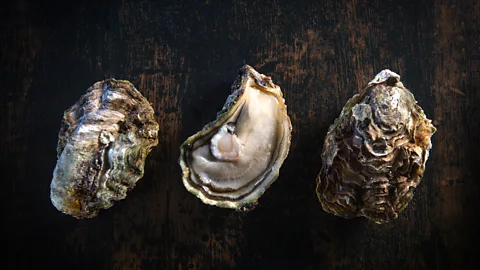 Getty Images
Getty Images"Desire is physical, psychosocial and relational, and involves a lot of variables. If you believe a food increases desire, the psychology of the placebo effect affects our capacity to get turned on or off," Wise says.
It's all about the context of the food we're eating, adds the University of Hertfordshire's Evans. "You don't think of chocolate as an aphrodisiac every time you break into Twix. You have to be in the right context," she says.
Our individual experiences also could be strong determinants of which foods boost sexual desire in each of us, says Jean-Christophe Billeter, associate professor of social and sexual behaviour at the University of Groningen in the Netherlands.
"Humans are very suggestive, and the brain is wired to form a strong memory when we have sexual success. Depending on the situation, if something happened in the environment where a person had sex, this will become something to trigger the desire to have sex in the future."
Another potential mind-related explanation for the aphrodisiac effect is our mood. Research suggests that a positive mood is associated with heightened sexual arousal, and diets rich in plant-based foods have been linked to a lower risk of anxiety and depression.
How evolution can explain aphrodisiacs
In fact, it may turn out that almost any food can have aphrodisiac qualities. At the very least, if a person is starving and there's no food around, it makes sense that their sex drive would go down.
 Getty Images
Getty Images"Evolutionarily speaking, humans have a desire to have sex in order to reproduce, and we need to be of a healthy weight and have a diet that provides the right nutrients in order to do this," Billeter says.
There is evidence that food regularly appeared in 17th-Century pornography for the same reason, says Evans: it was there to help fuel a couple for the next round.
In his experiments with fruit flies, Billeter has found that mating patterns change significantly when food isn't nearby. If fruit flies are in an environment where there is food, they'll mate with the first male they encounter up to seven times a day. If there’s no food, they only mate once.
There is also evidence from nature that we eat foods that make us look appealing to the opposite sex. Consider the characteristics of certain birds: males are more colourful because females find it attractive, and they achieve this colour by eating foods with carotenoids.
This applies to humans, too. "In the past, women deemed the most attractive tended to be fatter, as being fat when there wasn’t much food around could indicate the woman is good at reproducing," Billeter says.
There may also be an aphrodisiac quality inherent in the practice of giving food to a sexual partner – which perhaps explain the real reason a box of Valentine’s chocolates or a home-cooked meal can induce desire.
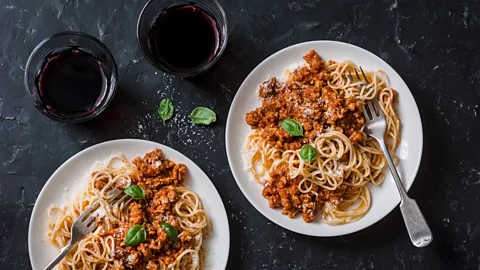 Getty Images
Getty Images"Spiders catch flies to present to females in order to mate, while a species of cricket produces a jelly-like structure to induce females into mating with them," Abbott says.
The idea of aphrodisiacs has survived so long because people have always been drawn to concepts that promise youth, longevity and fertility, Evans argues.
And for this reason, it's likely we’ll continue to believe in them for centuries to come.
* This article was originally published on 14 February 2019. It was updated on 13 February 2024 to include recent research.
--
If you liked this story, sign up for The Essential List newsletter – a handpicked selection of features, videos and can't-miss news delivered to your inbox every Friday.
